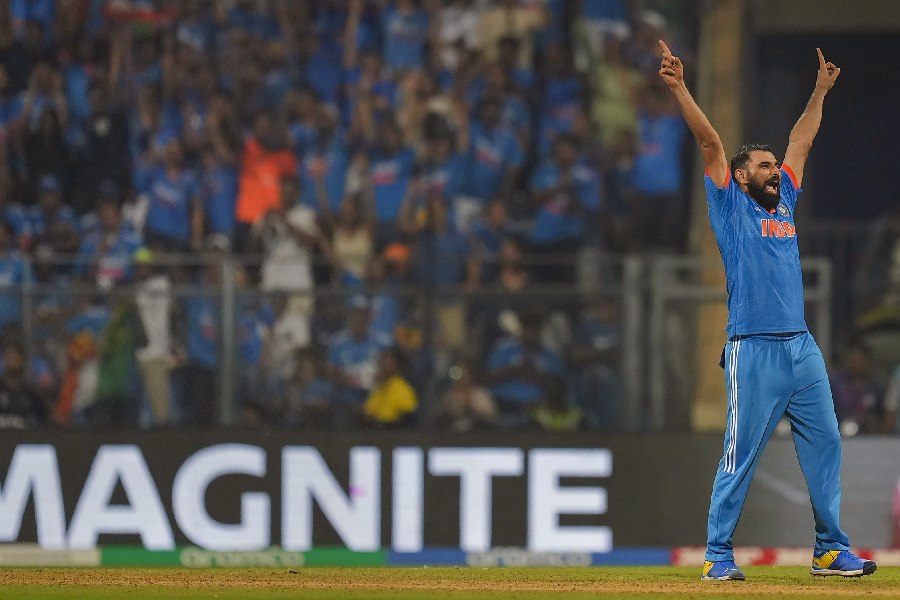Mohammed Shami possesses a rare ability of landing the ball in an upright seam position every single time and no coach in the world can create such a fast bowling "artist", gushed India's bowling coach Paras Mhambrey.
Shami, who finished on top of the bowling charts with 24 wickets from seven matches in the ODI World Cup, has been India's go-to bowler in ODIs and Tests.
Mhambrey, one of the quietest back-room workers in the current Indian set-up, doesn't want to take any credit for Shami's success.
Will India get another talent like Mohammed Shami? "Well, if I tell you that coaches could create a bowler like Shami, then I would be lying. If a bowler can land it on upright seam every time then every other bowler in the world will be Shami," Mhambrey told PTI in an exclusive interview before leaving for the tour of South Africa.
"It is a skill that Shami has acquired with tremendous hardwork and developed himself into the bowler that he is.
"Bowling ball after ball on the seam and with that perfect wrist position and getting it to move either ways is a rare skill set. A lot of bowlers, even if they land deliveries on the seam, will see the ball straightening up after pitching," Mhambrey said.
The former India pacer also spoke about another brilliant operator Jasprit Bumrah in the same vein.
"Even Bumrah with his unusual action gets the ball to move in or away with same action. This is an art and lot of hard work and dedication goes into perfecting the art." The way Shami and Bumrah have managed to dominate the the batters around the world is something that has surprised Mhambrey. Many would be envy of their success.
"I think in Test matches, we had Bumrah, Shami and Ishant (Sharma), who created this kind of magic but frankly speaking, if you ask me now if I would have expected this kind of dominance, I wouldn't have dreamt of this level of performance."
"I mean to bowl out Sri Lanka for 50 and then to repeat it against a team like South Africa, score 320 odd and bowl them out for 80. That was surreal. Obviously with an attack like ours, we expected them to do well but to put up such a performance on the biggest stage for such a sustained period was something that was really commendable."
The goal to create perfect bench-strength
Mhambrey, who came on board along with head Rahul Dravid was asked to assess the performance of Indian bowlers in the two-year cycle that ended with World Cup.
He spoke about the takeaways, like qualifying for WTC final, beating a strong Australian team and also becoming the first Indian team to win ODI series in England.
However Dravid and his team never lost sight of bigger picture, which is to create a bench strength.
"When we took over, we needed to see that two years down the line, we have also created a sufficient bench strength in every format. We had to identify at least 3-5 bowlers from next batch and also ensure that they get enough game time and are ready for the challenges of international cricket. Rahul, Vicky (Rathour), myself and (T) Dilip got together and identified the bowlers."
Is younger crop of fast bowlers averse to Test cricket
Mhambrey doesn't buy the notion that younger generation doesn't want to put in the hard yards required to become good Test match bowler but did agree that there will always be a group which would prefer white-ball cricket compared the to traditional format.
"I would never say people don't want to play red-ball cricket. Even now if you ask any aspiring fast bowler or spinner what is the format you want to excel in, he will always pick Test cricket first.
"Yes, obviously, there will be some bowlers, who would choose the white ball format. They would have probably played all formats and then decided that their game and skill-sets suit the white ball format more. Now that will be a very individual call and no one can do anything about it."
In bilateral T20Is, you need to know what you are looking at
Virat Kohli and skipper Rohit Sharma haven't played any bilateral T20I cricket since India's semi-final exit from the T20 World Cup in 2022.
They aren't part of T20Is in South Africa as both have taken a break from white-ball cricket for this series.
Mhambrey however said "in no way it means that bilateral T20Is aren't important" and they have specific targets in mind when it comes to playing such series.
"All I'm saying is that there is a balance that every player must maintain. Also it depends on who we are talking about. Players like Rohit, Virat look at very specific areas in their T20 games be it IPL or India.
"One would like to watch younger players during bilaterals and examine and understand areas of their adaptability - game awareness, pressure situations, how they adapt to these varied situations the Indian jersey carries," he concluded.
Except for the headline, this story has not been edited by The Telegraph Online staff and has been published from a syndicated feed.











